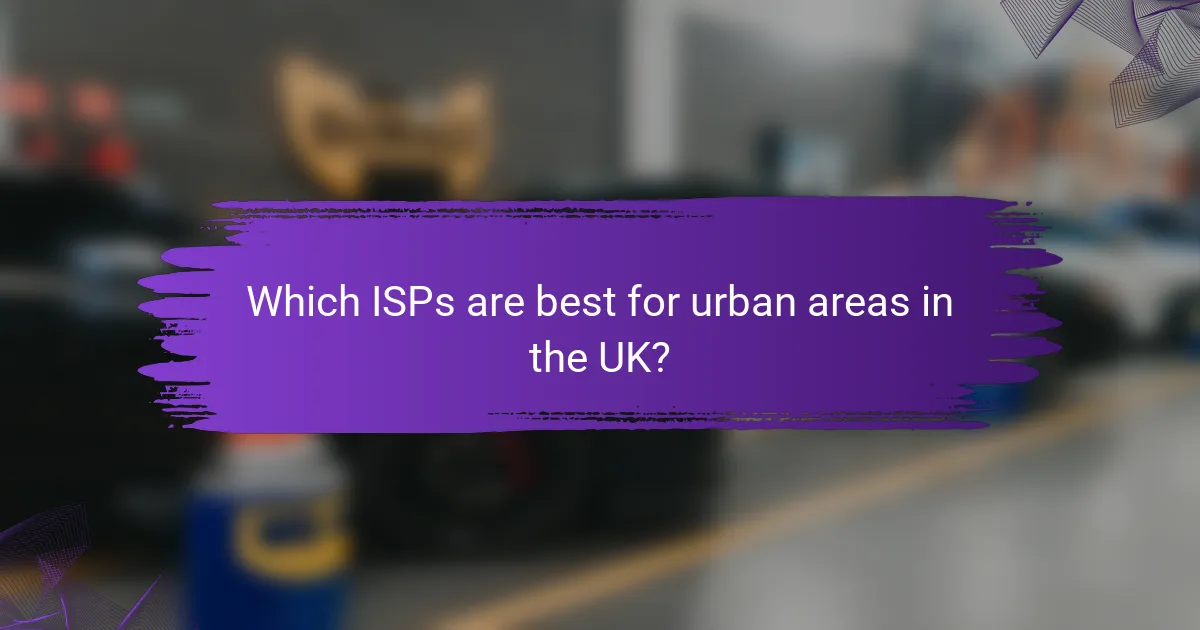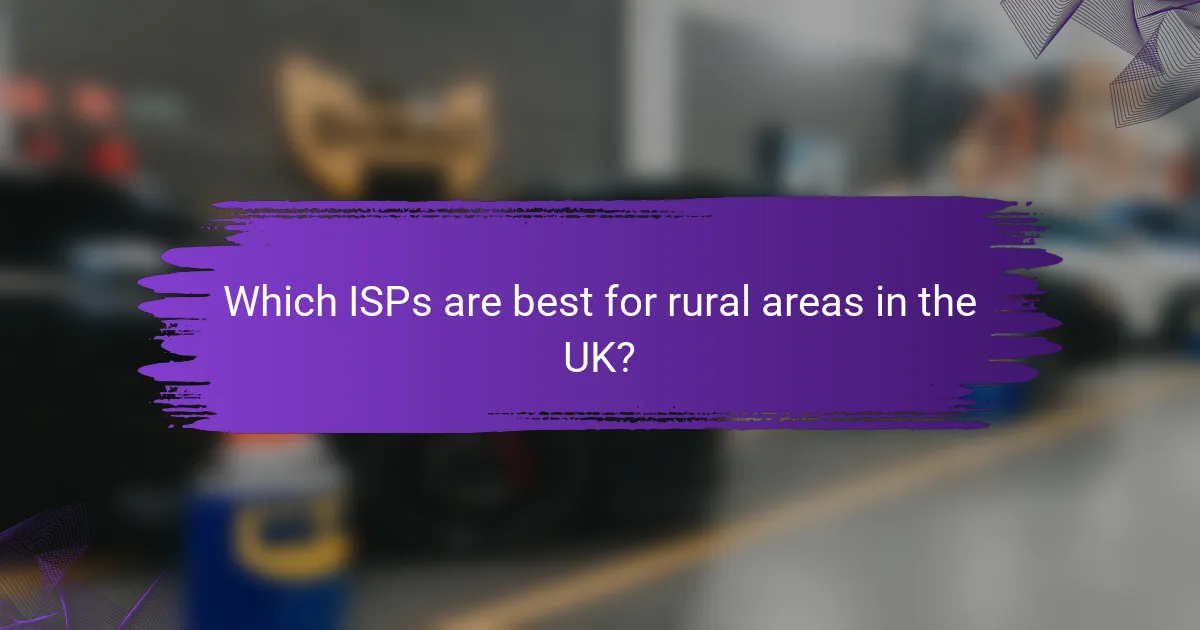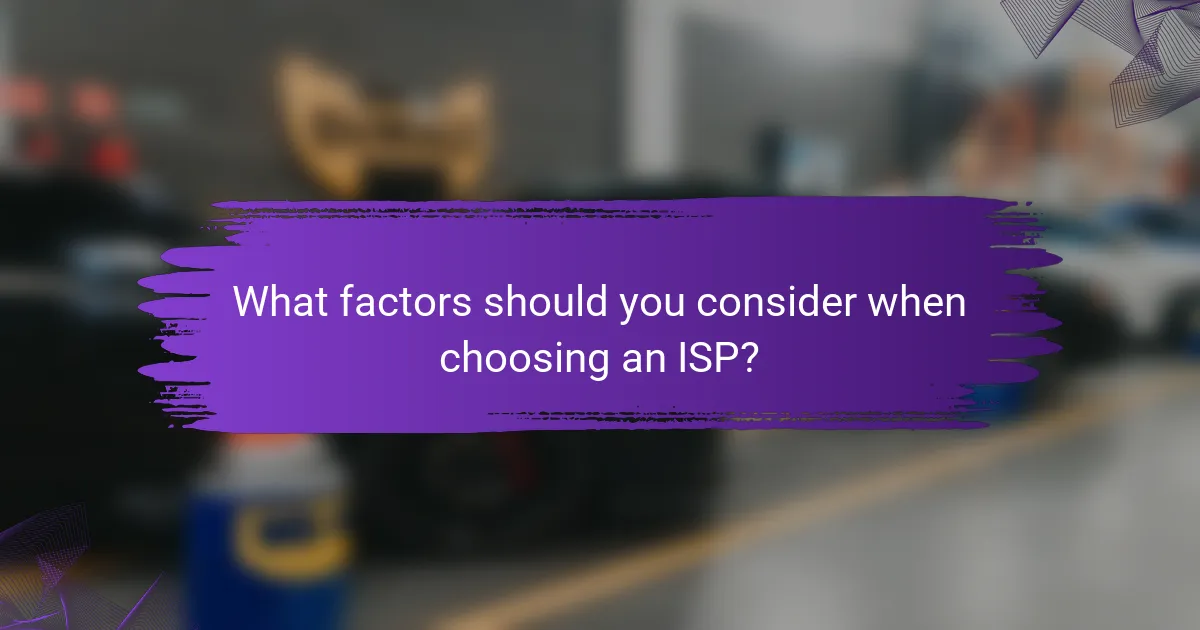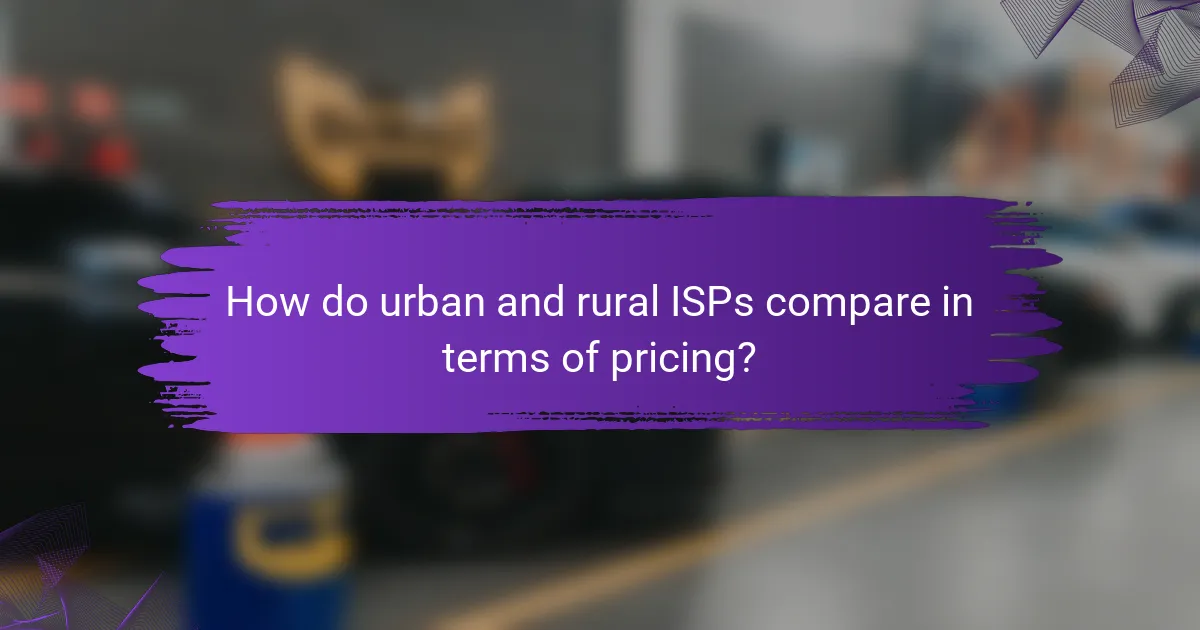Choosing the right Internet Service Provider (ISP) can significantly impact your online experience, especially when comparing urban and rural options. Urban areas often benefit from a variety of high-speed ISPs like BT Broadband and Virgin Media, while rural regions may rely on providers like Openreach and Gigaclear for reliable connectivity. Understanding the strengths and weaknesses of each option is essential for making an informed decision based on your specific needs.

Which ISPs are best for urban areas in the UK?
In urban areas of the UK, ISPs like BT Broadband, Virgin Media, and Sky Broadband stand out due to their extensive coverage and high-speed options. Each provider has unique strengths that cater to different needs, making it essential to evaluate them based on speed, reliability, and pricing.
BT Broadband
BT Broadband is known for its wide availability and reliable service across urban regions. It offers various packages, including superfast fiber options that can reach speeds of up to 900 Mbps, making it suitable for households with multiple users and heavy streaming needs.
When considering BT, check for any ongoing promotions or bundles that may include TV and phone services, which can provide additional value. However, be aware that installation fees may apply, so factor that into your overall cost.
Virgin Media
Virgin Media is a top choice for those seeking high-speed internet, with plans offering speeds from 54 Mbps to over 1 Gbps. Its cable network is particularly advantageous in urban areas, where it often provides faster and more stable connections compared to traditional broadband.
Before committing to Virgin Media, assess your specific usage needs and consider their contract lengths, which can vary. Additionally, watch for any hidden fees, especially related to installation or equipment rental.
Sky Broadband
Sky Broadband offers competitive packages that are well-suited for families and casual users. With speeds ranging from 11 Mbps to 900 Mbps, it provides flexible options depending on your internet habits, whether for browsing, streaming, or gaming.
Sky also includes perks like Sky Q TV integration and no upfront costs on some packages, making it an attractive option. However, check their customer service ratings and contract terms, as these can impact your overall satisfaction with the service.

Which ISPs are best for rural areas in the UK?
For rural areas in the UK, ISPs that offer reliable connectivity and good coverage are essential. Openreach, Gigaclear, and Community Fibre are among the top choices, each catering to different needs and providing various services.
Openreach
Openreach is a major provider in the UK, responsible for the physical network infrastructure. They offer services through various ISPs, ensuring widespread availability in rural regions. Their Fibre to the Premises (FTTP) technology can deliver high-speed internet, often exceeding 1 Gbps.
When considering Openreach, check which local ISPs utilize their network, as this can affect service quality and pricing. Many rural areas benefit from their extensive reach, but speeds may vary based on distance from the exchange.
Gigaclear
Gigaclear specializes in providing ultrafast broadband to rural communities, focusing on full-fibre connections. Their services can reach speeds up to 1 Gbps, making them an excellent choice for households with high data demands.
Gigaclear often works on community projects, so availability may depend on local initiatives. It’s advisable to check their website for specific coverage maps and potential rollout plans in your area.
Community Fibre
Community Fibre primarily operates in urban areas but is expanding into rural locations, offering competitive pricing and high-speed internet. Their focus is on delivering full-fibre broadband, which provides reliable and fast connections.
For rural users, it’s essential to verify if Community Fibre has extended its services to your area. They often provide flexible packages, making it easier to find a plan that fits your budget and usage needs.

What factors should you consider when choosing an ISP?
When selecting an Internet Service Provider (ISP), consider speed, data caps, and customer support. Each factor plays a crucial role in determining the overall quality and suitability of the service for your needs.
Speed requirements
Speed is a primary consideration when choosing an ISP, as it affects how quickly you can browse, stream, and download content. Urban ISPs often provide higher speeds, sometimes exceeding 1 Gbps, while rural options may offer lower speeds, typically ranging from 10 to 100 Mbps.
Evaluate your internet usage to determine your speed needs. For casual browsing and streaming, speeds of 25 Mbps may suffice, but for gaming or multiple users, aim for at least 100 Mbps. Always check if the ISP can deliver consistent speeds during peak hours.
Data caps
Data caps limit the amount of data you can use each month, which can significantly impact your internet experience. Many urban ISPs offer unlimited data plans, while rural providers may impose stricter caps, often between 150 GB to 1 TB per month.
Consider your household’s data consumption when choosing an ISP. If you stream videos, play online games, or work from home, opt for an unlimited plan to avoid overage fees. Always read the fine print to understand any penalties for exceeding data limits.
Customer support
Reliable customer support is essential for resolving issues quickly and efficiently. Urban ISPs typically have more resources and offer 24/7 support, while rural ISPs may have limited hours and fewer support channels.
Before committing to an ISP, research their customer service reputation. Look for reviews that mention response times and resolution effectiveness. Consider testing their support through a quick inquiry before signing up to gauge their responsiveness.

How do urban and rural ISPs compare in terms of pricing?
Urban ISPs generally offer more competitive pricing compared to rural ISPs, primarily due to higher competition and infrastructure density in cities. Rural ISPs often face higher costs for installation and maintenance, leading to higher prices for consumers.
Urban ISP pricing
Urban ISP pricing tends to be more affordable, with plans often ranging from $30 to $100 per month depending on speed and data limits. The presence of multiple providers fosters competition, which can drive prices down and lead to promotional offers.
Many urban ISPs offer tiered pricing structures, allowing consumers to choose plans that fit their usage needs. For example, basic plans may provide speeds around 100 Mbps, while premium plans can exceed 1 Gbps.
Rural ISP pricing
Rural ISP pricing is typically higher, with monthly costs often ranging from $50 to $150 or more. This increase is due to the limited number of providers and the higher costs associated with reaching remote areas.
Rural ISPs may offer fewer options, with speeds often capped at lower levels, such as 25 to 50 Mbps for basic plans. Consumers should consider the trade-off between speed and cost, as well as the availability of service in their specific location.

When is it better to choose an urban ISP?
Choosing an urban ISP is often better when you require high-speed internet and have multiple users in your household. Urban ISPs typically offer faster connections and more reliable service due to the infrastructure available in city areas.
High-speed internet needs
If you need high-speed internet for activities like streaming, gaming, or remote work, urban ISPs are generally the better choice. They often provide fiber-optic connections, which can deliver speeds exceeding 1 Gbps, compared to rural options that may only offer slower DSL or satellite services.
Consider your usage patterns; if you regularly download large files or participate in video conferences, the higher speeds available from urban providers can significantly enhance your experience. Look for ISPs that offer plans tailored to high-demand users.
Multiple users in a household
For households with several users, urban ISPs can manage multiple connections more effectively. They typically have higher bandwidth capacity, which means that several devices can stream, download, or browse simultaneously without significant slowdowns.
When selecting a plan, check the maximum number of devices supported and the total bandwidth offered. For families or shared living situations, plans that provide at least 100 Mbps per user are advisable to ensure everyone can use the internet comfortably.

When is it better to choose a rural ISP?
Choosing a rural ISP is often better when you live in a remote area with limited options. Rural ISPs can provide essential connectivity where larger providers may not reach, making them a practical choice for residents in these regions.
Limited availability in rural areas
In rural areas, internet service options are frequently limited due to lower population density. Many large ISPs focus on urban markets, leaving smaller, local providers to fill the gap. This can mean that the only available options are rural ISPs, which may offer unique packages tailored to local needs.
When considering a rural ISP, evaluate the types of services they provide, such as DSL, satellite, or fixed wireless. Each type has its advantages and disadvantages, including speed, reliability, and cost. For instance, satellite may offer wider coverage but often comes with higher latency and data caps.
It’s essential to research the specific offerings of rural ISPs in your area. Look for customer reviews and service availability maps to ensure you choose a provider that meets your internet needs effectively.
